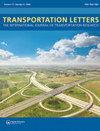A distributed deep reinforcement learning-based longitudinal control strategy for connected automated vehicles combining attention mechanism
IF 3.3
3区 工程技术
Q2 TRANSPORTATION
Transportation Letters-The International Journal of Transportation Research
Pub Date : 2025-02-07
DOI:10.1080/19427867.2024.2335084
引用次数: 0
Abstract
With the rapid development of connected automated vehicles (CAVs), the trajectory control of CAVs has become a focus in traffic engineering. This paper proposes a distributed deep reinforcement learning-based longitudinal control strategy for CAVs combining attention mechanism, which enhances the stability of mixed traffic, car-following efficiency, energy efficiency, and safety. A longitudinal control strategy is built using a deep reinforcement learning model. The CAVs gradually learn optimal car-following strategy in training process to improve safety, stability, fuel economy, mobility, and driving comfort. To further capture the interactions among vehicles in each platoon, the graph attention network is introduced to facilitate the car-following control strategy. To verify the effectiveness of the proposed method, a comparative analysis is conducted, which indicates that the proposed method can dramatically dampen oscillations, enhance traffic efficiency, reduce fuel consumption, and improve driving safety under different scenarios.
基于分布式深度强化学习的自动驾驶汽车纵向控制策略与注意力机制相结合
随着互联自动驾驶汽车的快速发展,自动驾驶汽车的轨迹控制已成为交通工程研究的热点。结合注意机制,提出了一种基于分布式深度强化学习的自动驾驶纵向控制策略,提高了混合交通的稳定性、跟车效率、能效和安全性。利用深度强化学习模型建立纵向控制策略。自动驾驶汽车在训练过程中逐步学习最优的跟车策略,以提高安全性、稳定性、燃油经济性、机动性和驾驶舒适性。为了进一步捕捉各排车辆之间的相互作用,引入了图关注网络,便于车辆跟随控制策略的实现。为验证所提方法的有效性,对比分析表明,所提方法在不同场景下均能显著抑制振荡、提高交通效率、降低油耗、提高驾驶安全性。
本文章由计算机程序翻译,如有差异,请以英文原文为准。
求助全文
约1分钟内获得全文
求助全文
来源期刊

Transportation Letters-The International Journal of Transportation Research
TRANSPORTATION SCIENCE & TECHNOLOGY-
CiteScore
6.40
自引率
14.30%
发文量
79
审稿时长
>12 weeks
期刊介绍:
Transportation Letters: The International Journal of Transportation Research is a quarterly journal that publishes high-quality peer-reviewed and mini-review papers as well as technical notes and book reviews on the state-of-the-art in transportation research.
The focus of Transportation Letters is on analytical and empirical findings, methodological papers, and theoretical and conceptual insights across all areas of research. Review resource papers that merge descriptions of the state-of-the-art with innovative and new methodological, theoretical, and conceptual insights spanning all areas of transportation research are invited and of particular interest.
 求助内容:
求助内容: 应助结果提醒方式:
应助结果提醒方式:


